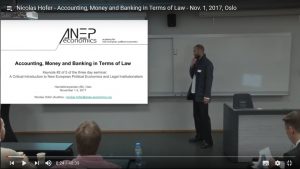Watch it by clicking on the image:
Nicolas clarifies the historically specific legal nature of assets & liabilities, using legal anthropology to distinguish reciprocity based mutual obligations of exchanging favours and gifts within a “Gemeinschaft” (as described in Marcel Mauss’ 1925 classic “The Gift” or in Marshall Sahlins 1972 classic essay “On the Sociology of Primitive Exchange” – for a short intro see here) from money-denominated, state enforceable legal obligations (“financial assets”) within a roman law-based civil society (“Bürgerliche Gesellschaft”).
He then introduces a foundational concepts of double entry bookkeeping: the balancing items net worth (equity) – this is what Luca Pacioli originally termed “il cavedale”, i.e., capital and probably the origin of the term “capital” – and net financial assets. The concept of net financial assets (a balancing item which, for a nation as a whole, is usually called international investment position) forms the core concept of Stützel’s mechanics of balances based ex ante theory of business cycles. It is the core concept allowing for a coherent integration of the real and monetary spheres in macro models.
Nicolas then develops this up to sectoral accounting for a closed economy (which is standard in National Accounting and also used in Modern Monetary Theory and Stock Flow Consistent Modelling), clarifying that capitalism is a zero sum game on the level of net financial assets – but not on the level of net worth (profits&losses). For example, it is impossible that all nations achieve positive (or negative) balances of trade/on current account within the same period – one nations surplus on current account will equal the rest of the world’s current account deficit by accounting identity. But it IS possible that all nations increase (or decrease) their net worth within the same period.
The next two videos – Presentations by Thomas Weiss and Prof. Johannes Schmidt – will present an introduction to Stützel’s theory of business cycles. Stay tuned, these will be published soon.
For a summary of contents of video and the complete seminar, click here.

